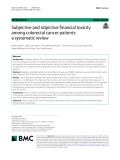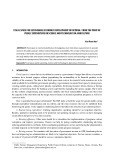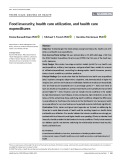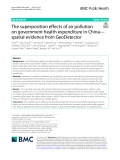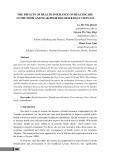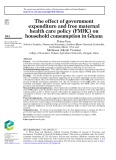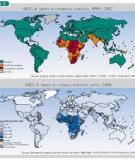
Government health expenditure
-
Colorectal cancer (CRC) is the third most common cancer type worldwide. Colorectal cancer treatment costs vary between countries as it depends on policy factors such as treatment algorithms, availability of treatments and whether the treatment is government-funded. Hence, the objective of this systematic review is to determine the prevalence and measurements of financial toxicity (FT), including the cost of treatment, among colorectal cancer patients.
 8p
8p  vishanshan
vishanshan
 27-06-2024
27-06-2024
 1
1
 1
1
 Download
Download
-
Ebook "Fiscal management" addresses these issues by providing tools to help assess a government’s fiscal health from the perspective of public accountability, including the political economy of the budget, performance-based budgeting, revenue performance, debt management, measuring a government’s net worth, assessing fiscal risks, reforming civil service, and strengthening institutions of accountability.
 292p
292p  tuongnhuoclan
tuongnhuoclan
 28-11-2023
28-11-2023
 4
4
 4
4
 Download
Download
-
Fiscal space is commonly defined as the budgetary room that allows a government to provide resources for public purposes without undermining fiscal sustainability. The concept of fiscal space was used extensively in the health, education sectors in the context of the Millennium Development Goals. In particular, the study defined view and research oriented public expenditure for science and technology in agriculture is suitable for the development of fiscal space. This is the content which will be discussed in this article.
 5p
5p  tethientran
tethientran
 27-07-2023
27-07-2023
 6
6
 3
3
 Download
Download
-
To disentangle the relationships among food insecurity, health care utilization, and health care expenditures. Policy makers and government agencies are focused on addressing deficiencies in social determinants of health and the resulting impacts on health status and health care utilization.
 11p
11p  vigamora
vigamora
 25-05-2023
25-05-2023
 5
5
 2
2
 Download
Download
-
Air pollution will increase the demand and utilisation of Chinese residents’ health services, thereby placing a greater economic burden on the government. This study reveals the spatial impact of socioeconomic, health, policy and population factors combined with environmental factors on government health expenditure.
 15p
15p  viferrari
viferrari
 28-11-2022
28-11-2022
 7
7
 3
3
 Download
Download
-
Improving health and reducing catastrophic healthcare expenditure for the poor and near-poor are the major concerns of the Vietnam Government. This research analyses the impacts of health insurance schemes for the poor and near-poor households in Vietnam on two aspects, including healthcare utilization and out-of-pocket expenditure.
 13p
13p  visherylsandberg
visherylsandberg
 18-05-2022
18-05-2022
 11
11
 1
1
 Download
Download
-
The results revealed that government expenditure had a negative and statistically significant effect on household consumption expenditure suggesting that government expenditure crowed-out private consumption in Ghana. Also, it was observed that before the implementation of the FMHC policy, there was an increase household consumption expenditure, but after the introduction of the FMHC policy, the study household consumption expenditure decreases significantly suggesting that FMHC policy has strong association with household consumption in Ghana
 19p
19p  inception36
inception36
 30-11-2021
30-11-2021
 13
13
 1
1
 Download
Download
-
At the same time that California is decreasing ECE funding, researchers throughout the nation are documenting the importance of the ECE industry as an engine of economic development. More than 58 states and localities have conducted analyses of the size and regional economic impact of the industry. Because of the way that ECE expenditures “ripple” through the local economy, this sector has been found to have an economic impact that rivals the impact of many of the industries that have traditionally received economic development dollars from local and state governments (Liu et al. 2004).
 55p
55p  trinhcaidat
trinhcaidat
 19-04-2013
19-04-2013
 62
62
 5
5
 Download
Download
-
The Forum on Emerging Infections was created by the Institute of Medicine (IOM) in 1996 in response to a request from the Centers for Disease Control and Prevention (CDC) and the National Institutes of Health (NIH). The purpose of the Forum is to provide structured opportunities for leaders from government, academia, and industry to meet and examine issues of shared concern regarding research, prevention, detection, and management of emerging or reemerging infectious diseases.
 285p
285p  layon_5
layon_5
 29-03-2013
29-03-2013
 86
86
 9
9
 Download
Download
-
The referral system is not functional, and patients often ignore secondary or tertiary care due to the high costs involved. Stock- outs of drugs and supplies and inadequate HRH availability impact service delivery. Lack of financial and human resources adversely impacts regulation and quality control. Many services, including those related to HIV and tuberculosis (TB), are not well integrated into the general health delivery system and continue to be provided vertically.
 81p
81p  nhamnhiqa
nhamnhiqa
 01-03-2013
01-03-2013
 61
61
 1
1
 Download
Download
-
In the single-payer system, the recurrent expenditure on health services is funded primarily through compulsory, non-risk-related contributions made by eligible individuals or from the state budget. The central government has almost exclusive power to formulate strategic direction and to issue and enforce regulations regarding health care. In 2009 Hungary spent 7.4% of its gross domestic product (GDP) on health, with public expenditure accounting for 69.
 0p
0p  nhamnhiqa
nhamnhiqa
 01-03-2013
01-03-2013
 52
52
 2
2
 Download
Download
-
The issue of health system financing has dominated the health care agenda of consecutive governments since the changeover from the communist regime. The first wave of reforms (1989–1993) transformed the system from one financed primarily through taxes to one based on compulsory health insurance. In 2009 Hungary spent 7.4% of its GDP on health, with public expenditure accounting for 69.7% of total health spending. Health spending has been unstable over the years, with several waves of increases followed by longer periods of cost-containment and budget cuts.
 71p
71p  nhamnhiqa
nhamnhiqa
 01-03-2013
01-03-2013
 52
52
 1
1
 Download
Download
-
Although the overall technical efficiency of the system has increased considerably, mainly due to the introduction of output-based payment systems, allocative efficiency remains a problem. Considerable variations exist in service delivery both geographically and by specialization, and equity of access is far from being realized, a fact which is mirrored in differing health outcomes for different population groups.
 39p
39p  nhamnhiqa
nhamnhiqa
 01-03-2013
01-03-2013
 45
45
 1
1
 Download
Download
-
Total health expenditure per capita is estimated at around US$ 13 (2007/2008), far below the target of US$ 34 recommended by the WHO Commission on Macroeconomics and Health to provide a basic package of services in low-income countries. According to the Medium-Term Expenditure Framework projections, health expenditure per capita is expected to reach US$ 15 by 2011. As of 2006/2007, 11 government total expenditure on health as a percentage of government expenditure was about 9%, far below the Abuja target of 15%.
 73p
73p  nhamnhiqa
nhamnhiqa
 01-03-2013
01-03-2013
 45
45
 1
1
 Download
Download
-
The concept of fungibility of aid resources highlights the fact that donor funded projects can simply allow partner governments to re-direct their own financial resources to other purposes (assuming that govern- ments would have spent their own money on the project(s) even if the donor funding was not available). For example, donor funding of Euro 100m to the Health Sector of a particular country could allow the partner government to then use (or ‘divert’) Euro 100m of its own resources (which it otherwise would have had to allocate to Health) to fund other uses (e.g.
 46p
46p  tainhacmienphi
tainhacmienphi
 25-02-2013
25-02-2013
 42
42
 6
6
 Download
Download
-
Many a reader who has followed the argument this far may be tempted to remonstrate that it is all well and good to speak of Government's having the responsibility to impose taxes and determine expenditures for such "social" purposes as controlling pollution or training the hard-core unemployed, but that the problems are too urgent to wait on the slow course of political processes, that the exercise of social responsibility by businessmen is a quicker and surer way to solve pressing current problems.
 24p
24p  mebachano
mebachano
 01-02-2013
01-02-2013
 42
42
 2
2
 Download
Download
-
This book is about change in the management of public services – how much of it and what consequences. For over two decades the goal of restructuring welfare provision has been at the heart of UK government policy. Under the Conservatives the focus was on controlling expenditure and re-organising services to make professionals more accountable for resource decisions. In health, education and social care, the objective was to install a system of managed provision heavily influenced by the practices of private firms.
 226p
226p  cronus75
cronus75
 16-01-2013
16-01-2013
 45
45
 4
4
 Download
Download
-
In an effort to modernize Medicare insurance, the Federal government has allowed private insurers who meet strict requirements to sell private insurance to the elderly, as a substitute for 'traditional' Medicare insurance. There are many forms of private insurance now being sold to the elderly, including some managed care plan types. Managed care plans restrict the choice of physicians and hospitals to include a set selected by the insurance plan, over whom the plan has more control in terms of utilization and expenditures.
 7p
7p  thankinhphanliet
thankinhphanliet
 01-01-2013
01-01-2013
 60
60
 4
4
 Download
Download
-
While there has been an increase in development assistance for health in general, this aid is volatile — often driven by profits and politics. Donor governments are susceptible to the political agendas of their parliaments, plac- ing a focus on short term results. Sustained health development does not fit this profile. Part of the solution lies in the harmonization or pooling of funds, focused around a single country plan, that is flexible and includes funding for both recurrent and capital expenditures.
 16p
16p  connicquy
connicquy
 20-12-2012
20-12-2012
 45
45
 5
5
 Download
Download
-
This primer gives a brief glimpse of available data on health care costs, and summarizes the impact of spending growth on various parts of society. The National Health Expenditure Accounts (NHEA), the source for several of the analyses shown, present the costs of care by type of health service or product (such as hospital care, physician services, or prescription drugs), sources of funds (such as private insurance, Medicare, Medicaid, or out-of-pocket by the individual patient), and types of sponsors (private business, households, and government).
 60p
60p  thangbienthai
thangbienthai
 27-11-2012
27-11-2012
 62
62
 9
9
 Download
Download
CHỦ ĐỀ BẠN MUỐN TÌM








